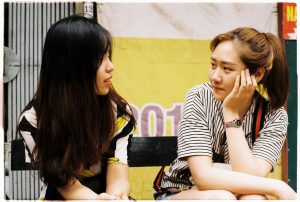If you need help or are experiencing crisis, please call the national suicide and crisis lifeline by dialing 988.
Caring for and walking with those whose hurt we cannot heal is part of the call and regular work of the pastor. We as Christians do not worship a God of quick fixes; we confess a God who is with us despite and in the midst of suffering. So, we cannot be afraid to name God’s presence even when things are difficult.
Begin With Awareness
 Mental illness, from the minor to the severe, affects the people we serve, no matter our context. According to the CDC, at the time of this publication, more than one in five U.S. adults live with a mental illness, and more than one in five youth (ages 13-18) either currently or at some point during their life have had a seriously debilitating mental illness. How do we pray with and for them?
Mental illness, from the minor to the severe, affects the people we serve, no matter our context. According to the CDC, at the time of this publication, more than one in five U.S. adults live with a mental illness, and more than one in five youth (ages 13-18) either currently or at some point during their life have had a seriously debilitating mental illness. How do we pray with and for them?
First, we cannot be afraid to name what so many other cultural forces invite us to ignore. Speaking with care of the human realities of addiction, PTSD, depression, suicidal ideation, and other forms of mental illness is important practice in our worship spaces and communal prayers if we are to invite people to bring their whole selves into community. Simply naming these realities as hurts and pains at work in the world goes a long way toward dispelling shame and sharing language for suffering. Removing the blame from the conversation and, instead, acknowledging and seeking God as the source of hope and freedom invites people to speak of their pain without feeling they are blamed or at fault, unlike what so often happens in other spaces.
In recovery communities, certain terms are often used to support individuals in finding how they might work toward health. Familiarizing oneself and one’s community with the terms used in such settings, both by those in a healing process and by mental health professionals, can go a long way in offering helpful prayers for those in the recovery process. Language such as “one day at a time” and praying for the “strength to do the work” can be constructive for people who are not sure whether they, in their experience as persons who are healing rather than healed, are welcome in the worship space.
Return Voice to Healing Community Members
 In addition to being mindful of language, it is helpful for the one ministering to seek out prayers, poems, and first-person accounts that speak to the experience of those suffering from mental illness. Offering words to pray that feel honest and authentic can be a great gift to people who have been taught that their suffering and frustration are somehow wrong or are not the sort of issues they should bring before God and the community. The Psalms are rich in such resources (see, for example, Psalms 88 and 139), as are the writings of the mystics—Julian of Norwich’s Showings, for example—and both types of resources can be adapted for liturgical use in prayers that focus on mental illness and community discipleship. For a more modern conversation, the book Darkness Is My Only Companion: A Christian Response to Mental Illness, by Kathryn Green-McCreight (Brazos, 2015), is a rich resource for those who are suffering from mental illness, for their supporters, for the community, and for the minister/pastor. All these resources point us away from the dangerous notion that there is an easy answer to the issues involved in mental illness and recovering from it.
In addition to being mindful of language, it is helpful for the one ministering to seek out prayers, poems, and first-person accounts that speak to the experience of those suffering from mental illness. Offering words to pray that feel honest and authentic can be a great gift to people who have been taught that their suffering and frustration are somehow wrong or are not the sort of issues they should bring before God and the community. The Psalms are rich in such resources (see, for example, Psalms 88 and 139), as are the writings of the mystics—Julian of Norwich’s Showings, for example—and both types of resources can be adapted for liturgical use in prayers that focus on mental illness and community discipleship. For a more modern conversation, the book Darkness Is My Only Companion: A Christian Response to Mental Illness, by Kathryn Green-McCreight (Brazos, 2015), is a rich resource for those who are suffering from mental illness, for their supporters, for the community, and for the minister/pastor. All these resources point us away from the dangerous notion that there is an easy answer to the issues involved in mental illness and recovering from it.
Shepherd the Whole Community
 As we welcome those in our midst who are suffering, it is also important to consider the ways this welcoming might affect the rest of the community. Congregants learn from their leadership how to talk with those suffering from mental illness and how to pray for and engage the topic of mental illness. They also learn boundaries from their leadership. While ministers and pastors are called to care for and walk with those who suffer, we must also remember our call to the body as a whole. That call may require prohibiting certain behaviors and confronting individuals, even individuals who are suffering. In all this work, remembering and naming that God is God and we are not (in prayer and beyond prayer) allows us to care for those who suffer while also maintaining our focus on community discipleship and mutual support, rather than creating a pastor/savior complex in ourselves or teaching people who are suffering that nothing is expected of them in terms of community life and discipleship.
As we welcome those in our midst who are suffering, it is also important to consider the ways this welcoming might affect the rest of the community. Congregants learn from their leadership how to talk with those suffering from mental illness and how to pray for and engage the topic of mental illness. They also learn boundaries from their leadership. While ministers and pastors are called to care for and walk with those who suffer, we must also remember our call to the body as a whole. That call may require prohibiting certain behaviors and confronting individuals, even individuals who are suffering. In all this work, remembering and naming that God is God and we are not (in prayer and beyond prayer) allows us to care for those who suffer while also maintaining our focus on community discipleship and mutual support, rather than creating a pastor/savior complex in ourselves or teaching people who are suffering that nothing is expected of them in terms of community life and discipleship.
Hold Both Pain and Hope
A prayer that recognizes the pain suffered in mental illness while at the same time holding hope in God might be:
God who goes with us, even into the depths, we have been afraid that our despair is too deep for grace and we have fallen too far from redemption. Our pain has disrupted our best thinking, pulled us away from loved ones, and left us isolated from the understanding and compassion we crave. Even in community, we feel lonely and frightened. Holy Spirit, we find a companion as we pray with the psalmist, while trusting that even in our anger you have promised to meet us with love.
O Lord, why do you cast me off? Why do you hide your face from me?
Wretched and close to death from my youth up, I suffer your terrors; I am desperate.
Your wrath has swept over me; your dread assaults destroy me.
They surround me like a flood all day long; from all sides they close in on me.
You have caused friend and neighbor to shun me; my companions are in darkness.
(Ps 88:14-18)
Loving God, we read in Scripture that “even the darkness is not dark to you.” Recall to us your light, so that we might find our footing again. Amen.
Other resources:
- Julian of Norwich: The Showings (Hampton Roads Publishing, 2022)
- Darkness Is My Only Companion: A Christian Response to Mental Illness (Brazos Press, 2015)
- Psalm 88
- Psalm 139
- Mental Health America Toolkit
- National Alliance on Mental Illness Mental Health Education
- Suicide Prevention Resource Center: Faith Communities
- UKIRK Spiritual Emotional Care Essential Tools Sheet
- PC(USA) Mental Health Ministry Guide
- UCC Mental Health Network
- UMC Mental Health Ministry Resources
- PC(USA) Racial Trauma and Mental Health Resource Center
The Rev. Karen Rohrer is a student in Pittsburgh Theological Seminary’s Doctor of Ministry Creative Writing and Public Theology cohort.
Read Next:







